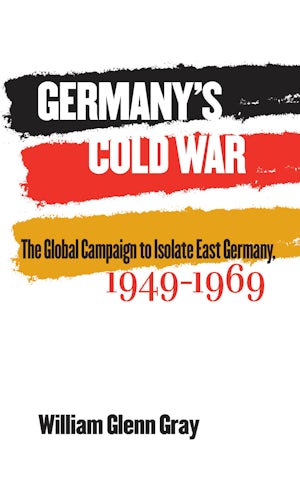Germany's Cold War
The Global Campaign to Isolate East Germany, 1949-1969
By William Glenn Gray
368 pp., 6.125 x 9.25, notes, bibl., index
-
Paperback ISBN: 978-1-4696-1471-7
Published: March 2014 -
E-book PDF ISBN: 979-8-8908-7408-5
Published: November 2003 -
E-book EPUB ISBN: 978-0-8078-6248-3
Published: November 2003
New Cold War History
Buy this Book
- Paperback $45.00
- E-Book $29.99
For Professors:
Free E-Exam Copies
Awards & distinctions
A 2003 Choice Outstanding Academic Title
Unwilling to accept the division of their country, West German leaders regarded the German Democratic Republic (GDR) as an illegitimate upstart--a puppet of the occupying Soviet forces. Together with France, Britain, and the United States, West Germany applied political and financial pressure around the globe to ensure that the GDR remain unrecognized by all countries outside the communist camp. Proclamations of ideological solidarity and narrowly targeted bursts of aid gave the GDR momentary leverage in such diverse countries as Egypt, Iraq, Ghana, and Indonesia; yet West Germany's intimidation tactics, coupled with its vastly superior economic resources, blocked any decisive East German breakthrough.
Gray argues that Bonn's isolation campaign was dropped not for want of success, but as a result of changes in West German priorities as the struggle against East Germany came to hamper efforts at reconciliation with Israel, Poland, and Yugoslavia--all countries of special relevance to Germany's recent past. Interest in a morally grounded diplomacy, together with the growing conviction that the GDR could no longer be ignored, led to the abandonment of Bonn's effective but outdated efforts to hinder worldwide recognition of the East German regime.
About the Author
William Glenn Gray is assistant professor of history at Purdue University.
For more information about William Glenn Gray, visit
the
Author
Page.
Reviews
"A persuasive interpretation set in an exhaustively researched, well-organized, and clearly written book that should be definitive for a generation."--Choice
"The competition between the two Germanys themselves has rarely been featured in discussions of the Cold War. . . . Germany's Cold War breaks new ground in this regard. . . . It brings to American readers an in-depth view of the Cold War's impact on the policies of one of the nations at the conflict's heart; it's a view that was neglected for too long."--Washington Post Book World
"Buttressed by an international range of archival sources, Gray has produced a lively and erudite account of an area of West German diplomacy that is too often written off as wooden and one-dimensional."--Central European History
"In Germany's Cold War, William Glenn Gray delves into an impressive mass of declassified archival documents to give a blow-by-blow account of how the FRG executed its will to stymie any effort to recognize the GDR as a sovereign state in international law and politics."--Modernism/modernity
"A perceptive and exceptionally well-written study of the Hallstein Doctrine, one of the key elements in West German foreign policy in the 1950s and 1960s. Through careful study of archival sources in a number of countries, Gray is able to show how that doctrine worked in practice and how basic policy changed over time. This book throws new and important light on the German question, the issue which more than any other lay at the heart of the Cold War."--Marc Trachtenberg, University of California, Los Angeles
"William Glenn Gray has taken one of the centerpieces of the Bonn Republic's diplomacy, the Hallstein Doctrine, and used it to tell a fascinating story about the reassertion of Germany's power after the disaster of World War II. Written in a clear and graceful style and researched in an extraordinarily thorough manner, the book makes the complicated political and legal distinctions of the doctrine understandable. It is an essential contribution to our understanding of the twentieth-century history of German foreign policy."--Thomas Schwartz, Vanderbilt University




